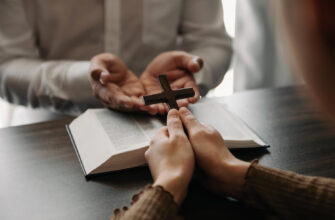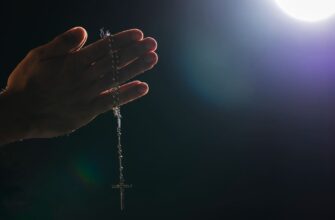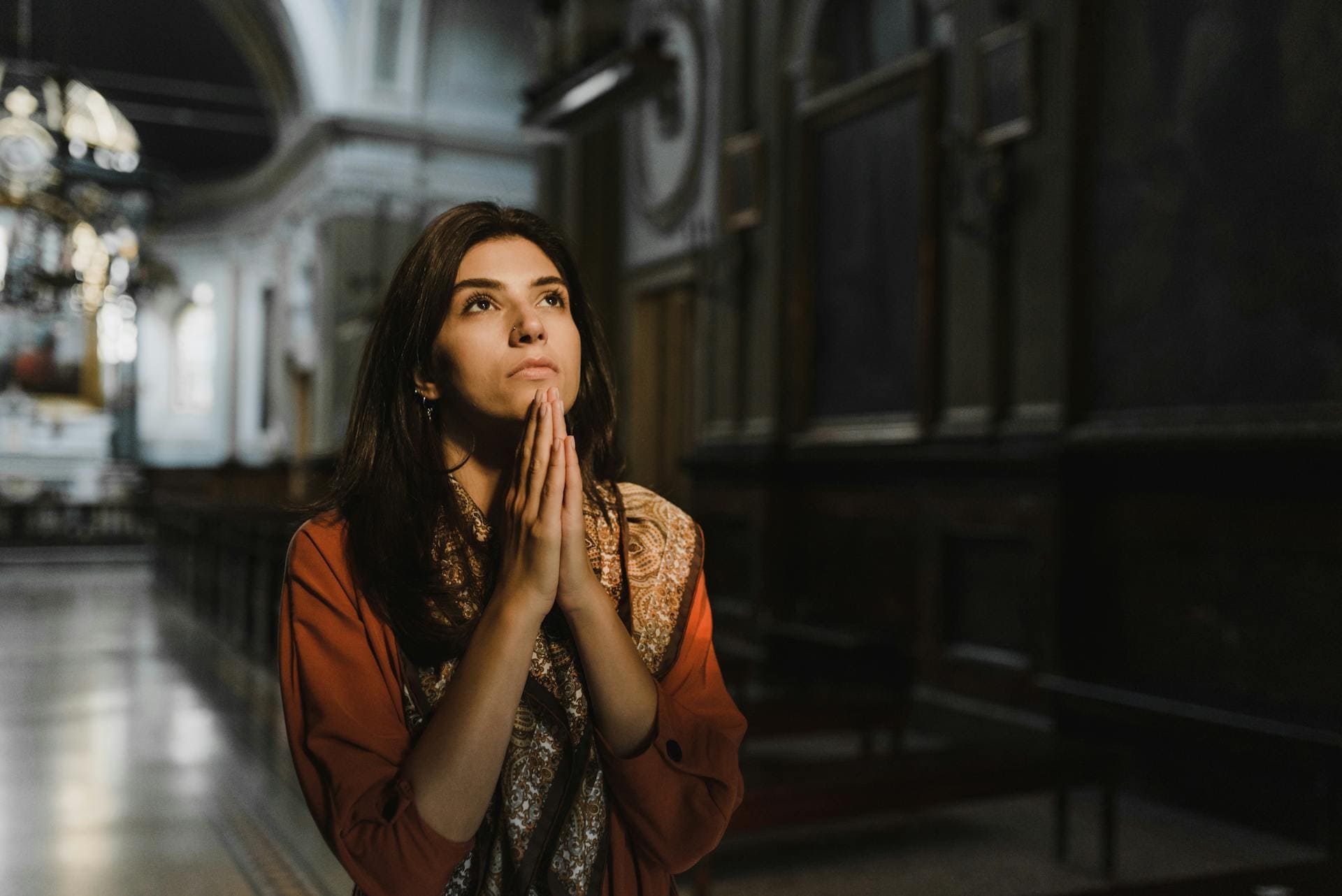Catholic Prayers For Faith (Full List & Guide) are an essential part of the Catholic faith.
These prayers are recited to strengthen one’s faith, deepen their relationship with God, and seek guidance during difficult times.
Whether it’s a prayer for strength, courage, or wisdom, there is a Catholic prayer for every need.
One of the most popular Catholic prayers for faith is the Act of Faith. This prayer is a declaration of belief in God’s existence and his divine nature. It is recited to affirm one’s faith and seek guidance during moments of doubt or uncertainty.
Another popular prayer is the Prayer of St. Francis, which is a powerful reminder to live a life of love, humility, and generosity. This prayer is often recited to seek guidance on how to live a life that is pleasing to God.
Catholic Prayers For Faith (Full List & Guide) are not just a means of seeking guidance or strength.
They are also a way to connect with God on a deeper level and express gratitude for his blessings.
Whether it’s a prayer of thanksgiving or a prayer for forgiveness, there is a Catholic prayer for every occasion.
In the following sections, we will provide a comprehensive list of Catholic prayers for faith along with a brief guide on how to recite them.
- Understanding Catholic Prayers
- Types of Catholic Prayers
- Vocal Prayers
- Mental Prayers
- Liturgical Prayers
- Common Catholic Prayers
- Importance of Catholic Prayers
- The Importance of Faith in Catholic Prayers
- The Act of Faith
- The Apostles’ Creed
- The Nicene Creed
- The Morning Offering
- The Angelus
- The Rosary
- The Chaplet of Divine Mercy
- Opening Prayers
- Decade Prayer
- Closing Prayers
- The Stations of the Cross
- Novena Prayers for Faith
- Prayers to Saints for Faith
- Prayer to St. Peter
- Prayer to St. Paul
- Prayer to St. Thomas
- Conclusion
Understanding Catholic Prayers
Catholic prayers are an essential part of the Catholic faith. They are used to communicate with God, to express gratitude, to ask for forgiveness, and to seek guidance.
There are different types of Catholic prayers, each with its own purpose and meaning.
Types of Catholic Prayers
Vocal Prayers
Vocal prayers are prayers that are spoken aloud. They are the most common type of Catholic prayer and are often used in group settings. Examples of vocal prayers include the Sign of the Cross, the Our Father, the Hail Mary, and the Glory Be.
Mental Prayers
Mental prayers are prayers that are said silently in one’s mind. They are often used for personal reflection and meditation. Examples of mental prayers include the Jesus Prayer, the Rosary, and the Liturgy of the Hours.
Liturgical Prayers
Liturgical prayers are prayers that are used in the context of the liturgy, such as Mass or the Sacraments. They are often recited by the priest or other official ministers.
Examples of liturgical prayers include the Eucharistic Prayer, the Penitential Rite, and the Prayer of the Faithful.
Common Catholic Prayers
There are many Catholic prayers that are commonly used by Catholics around the world. Some of the most well-known Catholic prayers include the Sign of the Cross, the Our Father, the Hail Mary, and the Glory Be.
Other popular prayers include the Act of Contrition, the Angelus, and the Divine Mercy Chaplet.
Importance of Catholic Prayers
Catholic prayers are an important part of the Catholic faith. They help Catholics to communicate with God, to deepen their relationship with Him, and to seek His guidance and blessings.
Praying regularly can also help Catholics to develop a sense of inner peace and spiritual strength.
The Importance of Faith in Catholic Prayers
Faith is an essential component of Catholic prayers. It is the foundation upon which Catholic prayers are built.
Without faith, Catholic prayers would be meaningless. Faith is the belief in God’s existence, His love, and His power to answer prayers. It is the trust that God hears and answers prayers, even if the answer is not what is expected.
Catholic prayers are an expression of faith. They are a way to communicate with God and deepen one’s relationship with Him.
Through prayer, Catholics can express their gratitude, ask for forgiveness, seek guidance, and request blessings. It is through prayer that Catholics can experience God’s presence and feel His love.
Faith in Catholic prayers is not blind. It is based on the teachings of the Catholic Church and the Bible.
Catholics believe that God’s Word is true and that it provides guidance on how to live a good and holy life. Catholic prayers are rooted in this belief and are a way to align one’s life with God’s will.
Faith in Catholic prayers is also a way to build community. Catholics believe that they are part of a larger family of believers.
Through prayer, Catholics can come together to support one another, share their joys and sorrows, and lift each other up in prayer.
This sense of community helps to strengthen one’s faith and provides a sense of belonging.
In conclusion, faith is an essential component of Catholic prayers. It is the foundation upon which Catholic prayers are built.
Through prayer, Catholics can express their gratitude, ask for forgiveness, seek guidance, and request blessings.
Faith in Catholic prayers is based on the teachings of the Catholic Church and the Bible and is a way to align one’s life with God’s will. It is also a way to build community and strengthen one’s faith.
The Act of Faith
The Act of Faith is a traditional Catholic prayer that expresses a firm belief in the Holy Trinity and the teachings of the Catholic Church. It is a way of affirming one’s faith in God and His divine plan.
The prayer begins with the words “O my God, I firmly believe that you are one God in three divine Persons, Father, Son, and Holy Spirit.” This statement affirms the belief in the Holy Trinity, which is a fundamental doctrine of the Catholic faith.
The Act of Faith goes on to express a belief in the divine nature of Jesus Christ, the Son of God. “I believe that your divine Son became man and died for our sins, and that he will come to judge the living and the dead.”
This statement affirms the belief in the redemption of humanity through the sacrifice of Jesus Christ and the belief in the Second Coming of Christ.
The prayer concludes with an affirmation of belief in all the teachings of the Catholic Church. “I believe these and all the truths which the holy Catholic Church teaches, because you have revealed them, who can neither deceive nor be deceived.”
This statement affirms the belief in the authority of the Catholic Church and its teachings.
The Act of Faith is a powerful prayer that can help strengthen one’s faith and provide comfort during times of doubt or uncertainty. It is often recited during Mass, in personal prayer, or as part of the Rosary.
The Apostles’ Creed
The Apostles’ Creed is one of the most fundamental prayers in the Catholic faith. It is recited during Mass and other liturgical services. The prayer is a statement of faith that outlines the basic beliefs of the Catholic Church.
The prayer begins with the words “I believe in God, the Father almighty, creator of heaven and earth.” This is a statement of faith in God as the creator of the universe and all that exists.
The prayer goes on to state belief in Jesus Christ, his only son, who was conceived by the Holy Spirit, born of the Virgin Mary, suffered under Pontius Pilate, was crucified, died, and was buried. On the third day, he rose again from the dead and ascended into heaven.
The prayer also expresses belief in the Holy Spirit, the holy catholic Church, the communion of saints, the forgiveness of sins, the resurrection of the body, and life everlasting. Each of these beliefs is a cornerstone of the Catholic faith.
The Apostles’ Creed is a powerful prayer that reaffirms the essential beliefs of the Catholic Church. It is a declaration of faith that unites Catholics around the world in a common belief in God, Jesus Christ, and the Holy Spirit.
The Nicene Creed
The Nicene Creed is a statement of Christian faith that is widely used in Catholic liturgy. It is a concise summary of the beliefs of the Catholic Church and is recited during Mass and other religious services.
The creed was first formulated in 325 AD at the Council of Nicaea and was later revised and expanded at the Council of Constantinople in 381 AD.
The Nicene Creed begins with the words “I believe in one God, the Father almighty, maker of heaven and earth, of all things visible and invisible.” This statement affirms the belief in one God who is the creator of all things.
The creed then goes on to affirm the divinity of Jesus Christ, stating that he is the “only begotten Son of God, born of the Father before all ages.” The creed also affirms the belief in the Holy Spirit, stating that it “proceeds from the Father and the Son.”
The Nicene Creed is an important part of Catholic worship and is recited by millions of Catholics around the world. It serves as a reminder of the fundamental beliefs of the Catholic Church and helps to unite believers in their faith.
The creed is a powerful statement of faith that has endured for centuries and continues to inspire believers today.
In addition to its use in Catholic liturgy, the Nicene Creed is also used in other Christian denominations, including the Eastern Orthodox Church and the Anglican Communion.
It is a testament to the enduring power of faith and the importance of shared beliefs in the Christian tradition.
The Morning Offering
The Morning Offering is a traditional Catholic prayer that is recited by many Catholics worldwide. It is a prayer of offering and dedication of oneself to God, acknowledging His presence in our lives and asking for His guidance throughout the day.
The prayer is usually recited first thing in the morning, upon waking up, and is meant to set the tone for the day ahead. It is a beautiful way to start the day, by offering everything that is to come to God and asking for His blessings and protection.
Here is an example of the Morning Offering prayer:
O Jesus, through the Immaculate Heart of Mary, I offer You my prayers, works, joys, and sufferings of this day for all the intentions of Your Sacred Heart, in union with the Holy Sacrifice of the Mass throughout the world, for the salvation of souls, the reparation of sins, the reunion of all Christians, and in particular for the intentions of the Holy Father this month. Amen.
The prayer is a powerful tool for deepening one’s faith and relationship with God. It is a reminder that everything we do, every joy and every struggle, can be offered up to God as a sacrifice and a way of glorifying Him.
In addition to being a personal prayer, the Morning Offering is also recited by many Catholic schools and organizations at the start of the day, as a way of uniting the community in prayer and dedication to God.
Overall, the Morning Offering is a beautiful and meaningful prayer that can help Catholics start their day off on the right foot, by offering everything to God and seeking His guidance and blessings throughout the day.
The Angelus
The Angelus is a traditional Catholic prayer that is recited three times a day: at 6 a.m., noon, and 6 p.m.
It is a devotion that commemorates the Incarnation of Jesus Christ, and it is named after the Latin word for “angel.” The prayer consists of three Hail Marys, a short verse, and a concluding prayer.
The Angelus begins with the ringing of a bell, which is meant to remind the faithful to pause and pray. The prayer then proceeds with the following verses:
- The Angel of the Lord declared unto Mary,
- And she conceived of the Holy Spirit.
- Hail Mary, full of grace, the Lord is with thee;
- blessed art thou among women,
- and blessed is the fruit of thy womb, Jesus.
- Holy Mary, Mother of God,
- pray for us sinners,
- now and at the hour of our death. Amen.
After the Hail Marys, a short verse is recited:
- Behold the handmaid of the Lord.
- Be it done unto me according to thy word.
The prayer concludes with the following:
- Hail Mary, full of grace, the Lord is with thee;
- blessed art thou among women,
- and blessed is the fruit of thy womb, Jesus.
- Holy Mary, Mother of God,
- pray for us sinners,
- now and at the hour of our death. Amen.
The Angelus is a powerful prayer that helps Catholics to meditate on the mystery of the Incarnation and to deepen their faith. It is a reminder that God became man in order to save us from sin and death, and that Mary played a crucial role in this plan of salvation.
By reciting the Angelus, Catholics are invited to join Mary in her praise of God and her submission to his will.
The Rosary
The Rosary is a popular Catholic prayer that involves the repetition of specific prayers and the contemplation of various events in the life of Jesus Christ.
It is a devotion that is often associated with the Virgin Mary, who is believed to have requested its use as a means of spiritual protection and intercession.
To pray the Rosary, one typically uses a set of beads to keep track of the prayers and meditations.
The beads are arranged in groups of ten, called decades, and each decade is associated with a specific mystery or event in the life of Jesus.
There are four sets of mysteries: the Joyful Mysteries, the Sorrowful Mysteries, the Glorious Mysteries, and the Luminous Mysteries.
The Rosary begins with the recitation of the Apostles’ Creed, followed by the Our Father, three Hail Marys, and a Glory Be. The Rosary then proceeds with the recitation of the decades, with each decade beginning with an Our Father and followed by ten Hail Marys and a Glory Be.
After the completion of the five decades, the Hail Holy Queen is recited, followed by a concluding prayer.
The Rosary is a powerful prayer that can be said privately or with a group. It is often used as a means of seeking spiritual protection, intercession, and guidance, and is considered to be a powerful tool for deepening one’s faith and relationship with God.
The Chaplet of Divine Mercy
The Chaplet of Divine Mercy is a powerful prayer that originated from the visions of Saint Faustina Kowalska, a Polish nun who had a profound devotion to the Divine Mercy.
This prayer is recited using ordinary Rosary beads of five decades and is a beautiful way to honor and seek the mercy of God.
Opening Prayers
The Chaplet of Divine Mercy begins with an optional opening prayer, which is followed by the Sign of the Cross.
The opening prayer is as follows:
“You expired, Jesus, but the source of life gushed forth for souls, and the ocean of mercy opened up for the whole world. O Fount of Life, unfathomable Divine Mercy, envelop the whole world and empty Yourself out upon us.”
Decade Prayer
After the opening prayers, the Chaplet of Divine Mercy is recited using the following prayer for each decade:
“Eternal Father, I offer You the Body and Blood, Soul and Divinity of Your dearly beloved Son, Our Lord Jesus Christ, in atonement for our sins and those of the whole world.”
Closing Prayers
Once the five decades are completed, the Chaplet of Divine Mercy concludes with the following closing prayers:
“Holy God, Holy Mighty One, Holy Immortal One, have mercy on us and on the whole world.” (Recited three times)
“O Blood and Water, which gushed forth from the Heart of Jesus as a fountain of mercy for us, I trust in You.”
The Chaplet of Divine Mercy is a beautiful and powerful prayer that can be recited at any time, but is especially recommended to be prayed at 3:00 PM, the hour of Divine Mercy.
By praying this Chaplet, one can experience the love and mercy of God and seek His forgiveness for their sins.
The Stations of the Cross
The Stations of the Cross is a Catholic devotion that commemorates Jesus Christ’s last day on Earth as a human. The devotion consists of 14 steps, or stations, that focus on specific events of His last day, beginning with His condemnation.
The stations are commonly used as a mini-pilgrimage as the individual moves from station to station.
The practice of the Stations of the Cross has been a significant part of Catholic tradition for centuries. It is a powerful way for believers to reflect on Jesus’ sacrifice and the meaning of His death on the cross.
Many Catholic churches have permanent Stations of the Cross installed on their walls, and others set up temporary stations during Lent.
The Stations of the Cross are typically prayed during Lent, particularly on Fridays, and on Good Friday, the day of Jesus’ crucifixion. The devotion is often done in a group, but it can also be done individually.
The traditional stations include:
- Jesus is condemned to death
- Jesus carries His cross
- Jesus falls the first time
- Jesus meets His mother
- Simon of Cyrene helps Jesus carry the cross
- Veronica wipes the face of Jesus
- Jesus falls the second time
- Jesus meets the women of Jerusalem
- Jesus falls the third time
- Jesus is stripped of His garments
- Jesus is nailed to the cross
- Jesus dies on the cross
- Jesus is taken down from the cross
- Jesus is placed in the tomb
Each station is accompanied by a prayer and meditation, allowing the faithful to reflect on the events of Jesus’ last day and their significance in their own lives. The Stations of the Cross is a powerful reminder of the sacrifice that Jesus made for humanity and a call to live a life of faith, love, and service to others.
Novena Prayers for Faith
Novena prayers are a form of devotion in the Catholic Church that involves praying for nine consecutive days for a specific intention.
Novena prayers for faith are a powerful way to deepen one’s relationship with God and strengthen their faith.
One popular novena prayer for faith is the Novena to the Holy Spirit. This novena is typically prayed in the days leading up to Pentecost Sunday, which celebrates the descent of the Holy Spirit upon the Apostles.
The Novena to the Holy Spirit is a powerful prayer for those seeking to deepen their faith and grow in their relationship with God.
Another popular novena prayer for faith is the Novena to St. Jude. St. Jude is the patron saint of impossible causes, and his intercession is often sought by those facing difficult situations or challenges in their lives.
The Novena to St. Jude is a powerful prayer for those seeking to strengthen their faith and trust in God’s providence.
The Novena to Our Lady of Perpetual Help is another powerful prayer for those seeking to deepen their faith. Our Lady of Perpetual Help is a beloved Marian devotion in the Catholic Church, and her intercession is often sought by those in need of spiritual guidance and support.
The Novena to Our Lady of Perpetual Help is a beautiful prayer for those seeking to grow in their relationship with Mary and deepen their faith in God.
In addition to these novena prayers, there are many other prayers and devotions in the Catholic Church that can help deepen one’s faith. These include the Rosary, the Divine Mercy Chaplet, and the Liturgy of the Hours, among others.
By incorporating these prayers and devotions into their daily lives, Catholics can strengthen their faith and grow in their relationship with God.
Prayers to Saints for Faith
Catholics often turn to the saints for intercession and guidance in their spiritual lives. Here are a few prayers to saints for faith:
Prayer to St. Peter
St. Peter was one of Jesus’ closest disciples and the first pope of the Catholic Church. He is often invoked for help in strengthening one’s faith.
Here is a prayer to St. Peter:
O Holy Apostle, St. Peter, I come to you today to ask for your intercession. You were the first to recognize Jesus as the Messiah, and you were given the keys to the kingdom of heaven. Please pray for me, that I may have the same faith and courage that you had. Help me to always trust in Jesus, even when things are difficult or confusing. Amen.
Prayer to St. Paul
St. Paul was a prolific writer and preacher who traveled extensively to spread the gospel. He is often invoked for help in deepening one’s understanding of the faith.
Here is a prayer to St. Paul:
O Holy Apostle, St. Paul, I come to you today to ask for your intercession. You were once a persecutor of Christians, but you were transformed by your encounter with Jesus on the road to Damascus. Please pray for me, that I may have a similar conversion of heart and mind. Help me to understand the teachings of Jesus and to live out my faith with joy and zeal. Amen.
Prayer to St. Thomas
St. Thomas was one of the twelve apostles and is best known for his initial skepticism about Jesus’ resurrection. He is often invoked for help in overcoming doubt and unbelief.
Here is a prayer to St. Thomas:
O Holy Apostle, St. Thomas, I come to you today to ask for your intercession. You doubted the resurrection of Jesus until you saw him with your own eyes, but when you did, you proclaimed him as your Lord and your God. Please pray for me, that I may have the same faith and conviction that you had. Help me to overcome my doubts and to trust in Jesus with my whole heart. Amen.
Conclusion
In conclusion, having faith is an important aspect of being a Catholic. It is through faith that one is able to connect with God and receive His blessings.
Catholic prayers for faith can help individuals strengthen their faith and deepen their relationship with God.
The full list and guide of Catholic prayers for faith provided in this article can be used by anyone looking to enhance their faith.
These prayers range from simple ones like the Act of Faith to more complex ones like the Litany of Faith. Each prayer has its own unique way of helping individuals grow in their faith.
It is important to note that praying for faith is not a one-time event. It is a continuous process that requires dedication and commitment.
By incorporating these prayers into their daily routine, individuals can strengthen their faith and grow closer to God.
Overall, Catholic prayers for faith can be a powerful tool for those seeking to deepen their relationship with God.
By using these prayers regularly, individuals can experience the peace and comfort that comes with having a strong faith in God.







